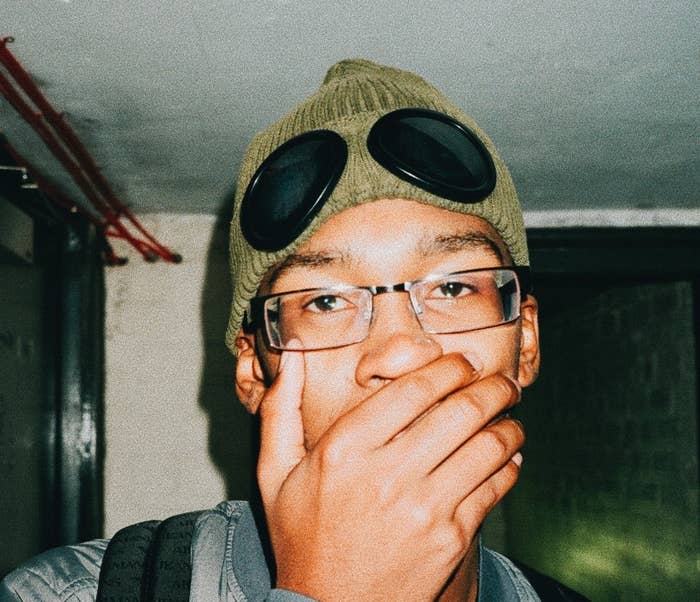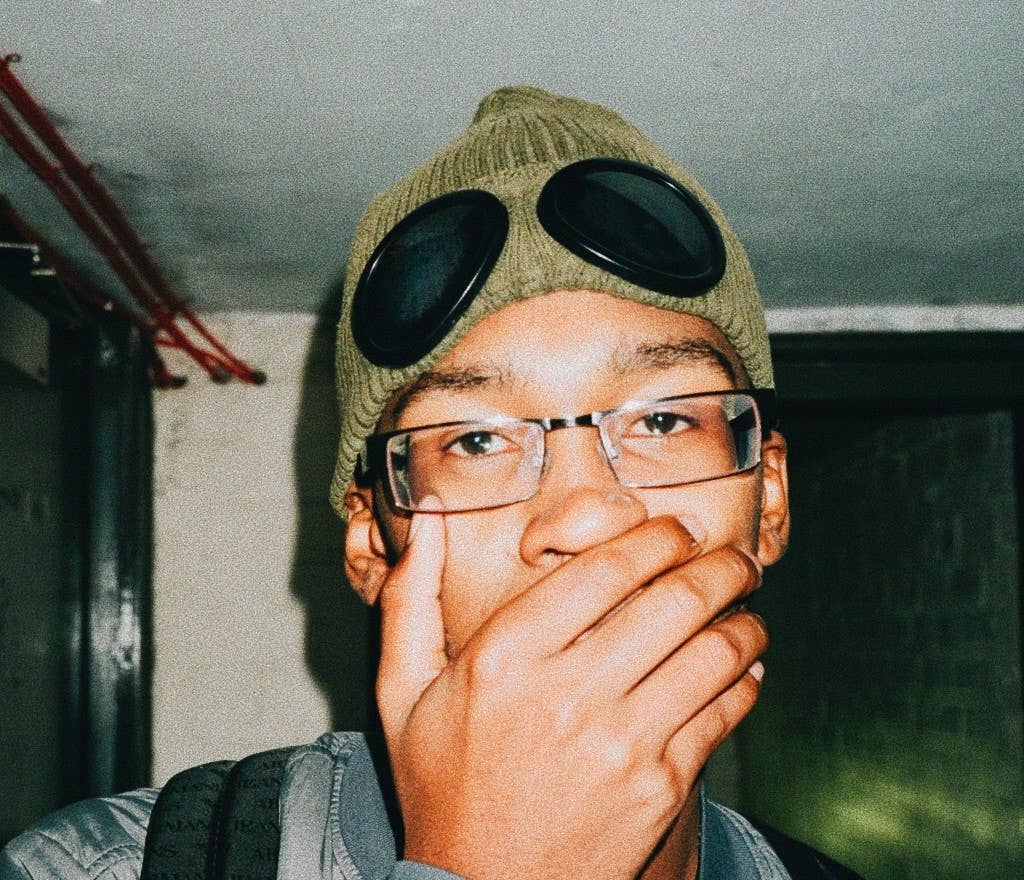
Kaylum Dennis is a prime example of what you can become when you combine an undeniable love for video directing, relentless hard work, and a humble personality. You only have to scroll through your favourite music vids on YouTube to notice the increasingly familiar 'Visuals By Kaylum' branding that subtly prefaces his work. At just 21, Kaylum has become the go-to video director for UK rap and grime's elite.
Whilst his schedule is overflowing with projects, Dennis' career today has been the result of years of hard graft and overcoming obstacles. Starting out with little to no experience in videography, he used his time wisely to learn about the craft of video-making; for him, it didn't come in the form of a traditional education, but more by picking up a camera, gaining knowledge from others and teaching himself. Working with likes of Pressplay Media and Link Up TV would help Dennis to not only work on his video directing skills but collaborate with some of the powerhouses of the scene, such as Smoke Boys (when they were known as Section Boyz), MoStack, and Yungen. Not just your average video director, Dennis' talent was also noticed by Stormzy who recruited him to #MERKY to take care of his music videos and tour content.
We caught up with the man of the hour to discuss his trajectory to becoming a rising star in music videography.
COMPLEX: How did you get into making music videos?
Kaylum Dennis: When I was younger, in school, around the age of 13 or 14—this was when YouTube was just coming up—I'd just started to find out about Link Up TV, GRM Daily, stuff like that, and me and my friends in school used to freestyle rap. Then we had an idea of starting up a YouTube channel and uploading videos but we didn't have a camera or anything, so we just used our Blackberry phones and uploaded a few videos and they got a couple thousand views. In media class, we started messing around with more cameras, playing with them a bit more, and tried to understand the art of video directing. So after we finished media in school—I was around 15 at the time—I just carried on. Then I started doing more videos of local artists, people like Yung Fume, Section Boyz, and then a platform called Pressplay Media reached out to me.
You've really created your own path in terms of making a career out of video directing. Today, do you think you can get away with not pursuing a traditional route, such as studying a course at a college or uni, and instead carve out your own lane?
100%! You don't need to do a course. I've learnt from YouTube tutorials. I know a few directors who I work closely with, they've literally learned from more practical work; picking up a camera, understanding a camera, watching YouTube tutorials online and getting advice from mentors to help them understand video directing. So I would say you don't actually need a course in this day and age, right now.
I used to bunk school to shoot videos.
Which UK video directors, if any, did you look up to on your rise? Whose work were you a big fan of?
Ade OG from Link Up TV, Chas Appeti, Capone and Elmino Da Great were people I used to look up to. I was like, "I want my career to look exactly like theirs." When I started working at Link Up, I was about 15; I dropped out of school so I worked there full-time. Ade was helping me, mentoring me, and taught me all of the basics.
Did you drop out to specifically pursue video directing?
Yeah, because I used to bunk school to shoot videos [laughs]. Then it got to the point where the school didn't even want me there because I was never there. It was just too hectic! Then it got to the point where I said to myself, "I think I should just drop out." So I did, and I had to go to college for about five hours a week. I think I was doing design, I wasn't even paying attention, but I was just doing that until the age of 16 and, at 16—the time when I dropped out—you didn't have to stay in education. So I just carried on working full-time. I didn't have the time for school, friends or anything like that. I carried on doing videos—that was all I was literally doing.
What were some of the challenges you had to overcome when you started pursuing video directing more seriously?
Owning a camera, that was the main thing. I only started owning a camera about two years ago; before that, I always used to rent them. I did a deal with an artist one time to get a camera and I had to give him free videos. It didn't work out, though, because my schedule was busy. I would then use my friend's camera; my friend needed the camera at certain times, so I couldn't always shoot my videos. That messed me up a bit as well because I'd be dealing with big artists and I'd have no camera, then I'd have to cancel stuff. Also money—it's only recently that I've started to see a proper, stable income. Before that, I was juggling, getting by, I'd have some money to get on the train—and that's about it. I wouldn't be able to do anything else.
That must be tough though because when you get to know people on a friendly level, I'm sure they ask you to cut them deals.
Yeah, it definitely is. I was always someone who couldn't say 'no'. If someone asked me for a video, I would feel awkward by saying no or asking for money because I found it a bit needy. But as I grew up, I understood that I'm providing a service so you have to get paid.
Since you directed the video for "Move With You (Remix)" for Wretch 32, Stormzy and Jacob Banks, you really have become the go-to director for the scene. What have been your keys to success in becoming so in-demand after this point?
Working closely with artists. I've got a handful of artists who I'm friends with, who are super big, like Stormzy, Yungen, there was Section Boyz at one point, Bugzy Malone, Skepta, Wiley. I know all these people. I can go to their house and chill and not work. So that was my main thing: actually being friends with them. I would always be around if they needed something shot, like: "Kaylum, can you do this now? Can you come here?" I'm always there around them.
You've worked with a lot of big names. How do you manage your creative vision with the artist's own when it comes to creating music videos?
Some artists are very specific. Certain artists always have an idea and are like, "Yo, I wanna do this type of video. I need this shot. I want that shot." So you just shoot it and add your own twist to it. But, sometimes, I will clash with the artist and say, "No, I say we do this." We then have a little back and forth, but we always come to an agreement. There isn't always a clash, though. A lot of artists are open.
Talk us through how your relationship with Stormzy came about.
So, I used to work with Section Boyz, and one day he asked me to edit a video for him: "Wickedskengman Part 4". I edited it with him. We always knew each other, we were always cool, but there was a time when he didn't have anyone filming his festivals and shows—this was when he was just coming up and blowing up to be super big. I was like, "No one is documenting anything on film. You can't see anything on film." Then I asked him if I could roll—festivals, shows, abroad shows. I was like: "I'll document everything." I went all around the world with him, to Tokyo, Hong Kong, Texas—everywhere—and I built a relationship from there.
#MERKY has opened up different platforms to harness opportunities for young talent in so many areas, such as scholarships and publishing. Do you think that today's UK music scene does enough of this to help open doors for young people?
I feel like now it does. Before? Nah, not at all. It was harder to get in the scene, but now there are so many avenues and areas to get in; you can get an apprenticeship at this place, or you can get a job here—there's always something you can do. Now I feel like the scene is fully stable and fully built, to a point where everyone can get in there if you really wanted to. You just have to know the right people and network.
You've had a good eye for working with artists that have gone on to blow up. How do you decide who you choose to work with?
I'm open to working with everyone; it's really just if I like your music. Growing up, I was a fan of all these people: Yungen, Krept & Konan, Stormzy, Section Boyz. I'm from South [London], and the people I'm close with are the people I've always listened to. I wanted to be around them when I was younger. I always listened to their music at school. So it was more like just being cool, in the general sense.
Out all of the projects you've been involved in, what is your highlight to date?
To date? I need to think about this one... MoStack's "What I Wanna" is up there for me. I feel like that's my best creative video. And then I had one with SL, "Tropical", in Iceland. I literally filmed that video in two hours, because the daylight in Iceland was just mad! Sunset was at 3pm, and rose at dawn at 12pm. I've also been involved in a book with Stormzy—that's currently out now [Rise Up: The #Merky Story So Far]. That's like something different because it's a book; it's not a video but it's a visual book. I feel like that's one of my best projects so far.
Are there any artists that you would love to create a video for that you haven't already?
Mahalia and Jorja Smith. They're two of my favourites right now.

